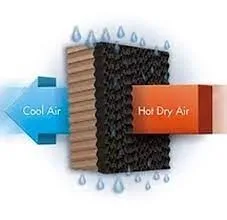In a world increasingly conscious of energy consumption and environmental impact, evaporative cooling systems are seeing a resurgence in popularity. As temperatures climb and demand for cooling rises, consumers and businesses alike are exploring alternatives to traditional air conditioning that are more energy-efficient and sustainable. Evaporative cooling systems, often referred to as swamp coolers, are emerging as an effective solution. Here’s why this classic technology is making a comeback in the modern cooling landscape.
Understanding Evaporative Cooling
Evaporative cooling is a natural cooling process that leverages the power of water evaporation to reduce temperatures. These systems operate by drawing warm air through water-saturated pads, where the heat from the air is absorbed, causing the water to evaporate and releasing cooler air in return. This method relies on basic principles of thermodynamics, providing cooling without the heavy energy use and refrigerants required by traditional air conditioning.
The Rise of Energy-Efficient Cooling Solutions
Traditional air conditioners consume a significant amount of energy, leading to higher utility costs and increased environmental strain. As energy prices rise, many are searching for alternatives that balance performance with efficiency. Evaporative cooling systems consume about 75% less energy compared to air conditioning, making them an appealing option in climates that are hot but not overly humid. This difference can translate to substantial savings over time, especially for those in regions with long, hot summers.
Improved Air Quality and Humidity Control
Another advantage of evaporative cooling is its positive effect on indoor air quality. Unlike air conditioning, which recirculates air, evaporative coolers pull in fresh air from outside, reducing the concentration of indoor pollutants and allergens. Additionally, the added humidity in the cooling process can be beneficial in dry climates, helping to prevent respiratory issues and discomfort caused by excessively dry air. However, in humid regions, this feature can be less effective, as the added moisture may feel clammy.
Lower Carbon Footprint and Eco-Friendly Design
One of the most significant advantages of evaporative cooling is its environmentally friendly design. Traditional air conditioning systems rely on refrigerants like hydrofluorocarbons (HFCs), which are potent greenhouse gases. Evaporative coolers, on the other hand, use only water and a fan to generate cool air, drastically reducing emissions and avoiding refrigerants altogether. For eco-conscious consumers, this can make a considerable impact in terms of reducing one’s carbon footprint and contributing to sustainability goals.
Technological Innovations Driving Demand
Recent advancements have significantly improved the efficiency and functionality of evaporative cooling systems. Today’s models often include features like programmable thermostats, multi-speed fans, and even smart connectivity options, allowing users to control and monitor their systems remotely via smartphone apps. These innovations help optimize cooling performance while maintaining low energy consumption, making them more convenient and adaptable for modern living.
Cost-Effectiveness in the Long Term
The initial cost of an evaporative cooler is often lower than that of a standard air conditioner, and with the added benefit of lower energy usage, the long-term savings can be substantial. Maintenance is also generally easier and more affordable, as there are fewer complex components to repair. For those seeking budget-friendly and reliable cooling, this technology offers a sensible solution.
Is Evaporative Cooling Right for You?
While evaporative cooling offers numerous advantages, it’s important to consider climate before making a choice. These systems work best in hot, dry environments, such as the southwestern United States, where humidity levels remain low. In humid climates, however, traditional air conditioning may still be the better choice for consistent cooling.
Conclusion
With their energy efficiency, eco-friendliness, and ability to improve air quality, evaporative cooling systems are gaining renewed interest in the cooling market. As consumers become more focused on sustainability and cost savings, the comeback of evaporative cooling is both timely and beneficial. Whether for homes, offices, or commercial spaces, this smart cooling solution provides a practical alternative to traditional air conditioning, promoting a greener and more affordable future for all.



